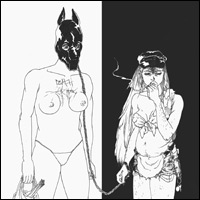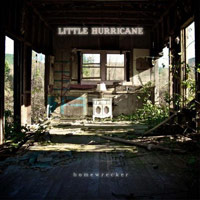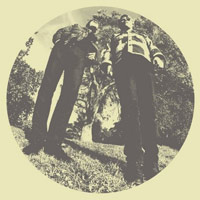
Master of My Make-Believe
Atlantic/Downtown
Five years ago, if you were to do a quick survey to see who was excited about a Santi White solo album, there likely wouldn’t have been much of a response. Sure you may have stumbled upon fans of her unheralded but excellent band Stiffed or her work on Res’ How I Do, but most would draw a blank. Then came Santogold. If there was ever a case of being in the right place at the right time, that record would have to be a testbook example. After a modest start, it seemed like the record and White were everywhere. Almost overnight, White went from a nobody to a critical and popular darling. The fact that’s it’s been four years since her breakthrough with no proper follow-up seems improbable. But the wait is over as White has unveiled her sophomore album, Master of My Make-Believe.
Not to make too fine a point of it, but White benefited from coming out in the post-MIA world. While superficially “Creator” and working with Diplo and Switch would seem to be overtly courting MIA’s fanbase, it was more a matter of shared influences and friends. And if you heard White’s other work, Santogold is a fairly logical continuation. So now the questions are how does White’s path progress four years out and can she avoid the dreaded “sophomore slump?”
For fans of the debut, good news, you’ll probably love Master of My Make-Believe. White was very smart in keeping her sonic palate wide on Santogold and she continues in the same vein on Master. It’s not a carbon copy, but it does have the same type of style-jumping. So there are new wave moments sitting next to dancehall tunes with a smear of Moombahton and some Kate Bush–like moments. It’s the type of record that in its parts is wildly all over the place, but taken as a whole is amazingly coherent. It’s the type of record that balances dancefloor bangers with songs that sound like hits without getting too desperate about it. Simply put Master of My Make-Believe is a fantastic follow-up and deserves to be your soundtrack for the next two summers. That is unless White decides to step up her release schedule.
Dorian S. Ham

The Money Store
Epic
Just the sheer audacity of Zach “usually too avant for his own good” Hill’s latest project, Death Grips, is enough to be shocking in an age when nothing’s shocking. To think that LA Reid was air drumming to these beats in a penthouse office at Epic Records is an absurdity that wouldn’t make sense in any era. Maybe he just wants an Odd Future to call his own. Without much thought, Hill, producer Andy Morin and vocal brute Stefan Burnett cannonball into a post-modernist zone where nothing is off limits, rap-rock is finally hip, and kids everywhere covet their scratched copies of the Judgment Night soundtrack. If you can stay till the end of The Money Store, you’ll soon learn that the album represents a catch-all for modern extremities. When I first heard Death Grips’ “ExMilitary,” I wanted to imagine this music surfaced from an anachronous setting in the Deep South, with two teens battling wits with noises culled from thrift store sources and out sounds they made in an industrial arts classroom. But the devil is in the details. My thoughts were about half right, as Hill and company gather from low-tech equipment almost with a punk frugalness. But the songs, while perhaps punk in spirit, are more akin to the Bomb Squad’s blaring maximalist collages.
With a defiant disregard to all that is sacred in modern music and an intensity usually reserved for war footage and snuff films, The Money Store is a schizophrenic attack of blast beats and warped samples coalescing in a haze of face-melting sonics. Still, for the average listener, there’s either an immediate connect or there’s not. Despite Hill self-proclaiming Death Grips as “futurists” with little regard to the past, The Money Store’s best moments occur when it reminds us of that past. The sawing “I’ve Seen Footage” steals liberally from Salt and Pepa’s “Push It,” and “Hustle Bones” is a slice of meth-inspired rollerskate boogie. Whether it’s Miami bass measures, odes to baile funk, or the electroclash leanings of “Hacker,” turning the last 30 years of trash culture into combative hip-hop does work for Death Grips. And even if the long-lost New Kingdom may have done it years ago, and even if at times it sounds like a step away from an Everlast outtake, The Money Store will absolutely be the most compelling thing you’ll hear in 2012.
Kevin J. Elliott
MP3: “Get Got”

Aufheben
A
For all the ups and downs the band has experienced in its 20-year existence, the Brian Jonestown Massacre was once remarkably consistent in its output, even amidst periods of great prolificness. However, after obtaining a bit of notoriety following the release of the Dig! documentary in 2004, principle member Anton Newcombe seemed to lose sight of the prize. Subpar records like My Bloody Underground exchanged “experimentation” for substance, and Newcombe finally seem destined to disappear into the wormhole of his mind (or up his own ass).
But perhaps there will still be more to the Brian Jonestown Massacre story, as Aufheben reveals Newcombe’s creative spark to have finally once again emerged from the shadow of his ego. Moreover, it successfully merges his past with his present (or perhaps future). The inclinations towards various forms of electronica that Anton has shown in recent years have been successfully melded with the lysergia of his past work, as well as a good deal of Eastern accents. Joined by past collaborators like bassist Will Carruthers (formerly of Spacemen 3, Spectrum and Spiritualized) and (amazingly enough) returning guitarist Matt Hollywood, Newcombe has injected a good deal of light into the proceedings. Tracks like “Illuminomi” and “Blue Order New Monday” absolutely sparkle, trading some of the guitar vitriol of the past for a buoyancy derived from both organic and synthetic sources. Much of the lyrical content is obfuscated so it’s hard to get a true sense of what’s on Anton’s mind, but it matters little when its fruits are this pleasing sonically.
Stephen Slaybaugh

Homewrecker
Unknown Behavior
Celeste “CC” Spina (drums, vocals) and Anthony “Tone” Catalano (guitar, vocals) have been playing together for only a short while, but the duo, who perform under the moniker Little Hurricane, have already managed to make significant waves in San Diego, winning the 2010 Best New Artist Award at the San Diego Music Awards after just six short months in existence. Now, thanks to song appearances on television shows like Gossip Girl (“Haunted Heart”) and Revenge (“Get By”) and the release of their debut full-length, Homewrecker, their once tiny storm is picking up momentum, and rightfully so.
Though the pair has been often compared to the White Stripes for obvious reasons, Homewrecker makes it clear that, despite certain similarities, Little Hurricane succeed in distilling a wide range of influences to create a blues-rock sound all their own. From the blistering “Trouble Ahead” to the decidedly more restrained “Sweet Pea,” it’s clear that there’s more motivation to Little Hurricane than merely cloning the sound of the now-defunct peppermint duo. Whereas the White Stripes’ brilliance lay in the simplicity and sheer determination of their sound (not to mention Jack’s omnipresent guitar), Little Hurricane aims for the opposite. Homewrecker is clean, composed and expertly engineered, and the constant communication and banter between CC and Tone is both fresh and refreshing. If anything, these two work more like Dan Auerbach and Patrick Carney than Jack and Meg.
This amalgamation of blues, Southern rock and folk is at its peak on tracks like the soulful “Get By” and the charmingly gritty “Lies,” but even the slower bits, like the beautifully somnolent “Sweet Pea” or the minimalist drum beats on “Tear Bucket” are enjoyable. In the end, regardless of (or perhaps in spite of) the constant comparisons, Homewrecker serves as a solid reminder of the large sound that two people can make when they work together. And with the White Stripes out of the picture, what better time than now for Little Hurricane to fill the void—or as I suspect—find their own niche?
Jennifer Farmer

Hair
Drag City
Seemingly unable to sit still for very long, Ty Segall has been spitting out records at a rapid pace the last few years. For his latest endeavor, the Bay Area musician has teamed with White Fence (a.k.a. the Strange Boys’ Tim Presley), who having recorded two other albums for release this year, is no slacker himself. Thankfully not a reinterpretation of the hippie musical, this eight-track album manages to successfully marry the two’s similar but distinct personalities without either being lost in the mix.
Ty seems to be the straight man in this marriage, his pop and rockist instincts all the more apparent in contrast to Presley’s trippy disposition. Still, as previously stated, the differences turn out to be complimentary. For example, “I Am Not a Game” could just be a straightforward romp, but the wavy keyboard parts help take the track in other directions. On the flipside, “The Black Glove/Rag” might just be another “Hurdy Gurdy” sequel, but Segall helps give it a jagged edge it most likely would otherwise lack. With the two approaches working in a peanut butter and chocolate kind of combination, Hair possesses qualities that both dudes might otherwise be missing on their own. One can’t help but love it when a plan comes together like this.
Stephen Slaybaugh
MP3: “I Am Not a Game”
ALBUM REVIEWS
Battles, Dross Glop
Sidi Touré, Koima
Screaming Females, Ugly
Lioness, The Golden Killer
Literature, Arab Spring
Robert Pollard, Mouseman Cloud
Dean Blunt and Inga Copeland, Black Is Beautiful
Dante Vs Zombies, Buh
Lords of Acid, Deep Chills
Paul Weller, Sonik Kicks
Bear in Heaven, I Love You, It's Cool
Orbital, Wonky
Carter Tutti Void, Transverse
Ministry, Relapse
